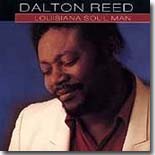|
Dalton Reed
Louisiana Soul Man
Bulleye Blues |

Back in the early ’90s, I picked up Dalton Reed’s
Louisiana Soul Man sort of as an
afterthought. I was not familiar with him at all,
but I had always had pretty good luck with most of
my purchases from Rounder Records’ Bullseye Blues
catalog, so I thought I would give it a try. It was
one of the best impulse decisions I’ve ever made.
Reed, from Lafayette, LA, was like many soul singers
in that he came from a religious background, singing
in his church choir (and still serving as music
minister at his church when Louisiana Soul Man
was released). After graduating from high school, he
worked in several local R&B bands as a singer and
playing trombone, trumpet, or piano. One of his
bands, Dalton Reed and the Musical Journey Band,
even backed up Rockin’ Sidney for a few months
during Sidney’s “Don’t Mess With My Toot Toot” days.
Despite the Zydeco connection, Reed’s first love was
soul and R&B, and singers like Ray Charles, Otis
Redding, Sam Cooke, Teddy Pendergrass, and Luther
Vandross. In the late ’80s, he released a couple of
45’s that did well locally. Rounder Records producer
Scott Billington happened to hear these 45’s on the
juke box at El Sid O’s Zydeco Club in Lafayette, and
on the recommendations of many of the area
musicians, Reed was given an audition and an
opportunity to record.
Louisiana Soul Man features ten tracks of
Southern soul, mostly new material contributed by
familiar names in the genre. The opening tune, “Read
Me My Rights,” was written by Johnny Neel and
Delbert McClinton. It’s been done by several other
artists, like Ann Peebles and McClinton himself, but
their versions don’t hold a candle to Reed’s. His
version is still one of my all-time favorite
Southern soul tracks. Dan Penn also contributes a
couple of tunes, including the amusing “Blues of the
Month Club,” and the memorable “Full Moon” is the
work of Doc Pomus and Dr. John.
Reed also co-wrote several tracks, including the
exuberant “Keep On Loving Me” (with Zeno and
Billington), “Keep The Spirit” (with Samuel), and
the deliciously funky “Party On The Farm” (with
Zeno). “I’m Only Guilty of Loving You,” from Dave
Williams and Mick Parker, is another highlight with
a heartfelt vocal from Reed. If Reed’s influences
weren’t clear at the beginning, the closing track
should seal the deal. His reading of Otis Redding’s
“Chained And Bound” is outstanding.
Billington assembled a crack band of South Louisiana
musicians, including Buckwheat Zydeco bassist Lee
Allen Zeno (who also helped produce the album),
guitarist Mark “Boudin” Simor (formerly of Johnny
Allen, Warren Storm, and Terrence Simien),
keyboardist Gordon Wiltz of the Boogie Kings, and
drummer David Peters (formerly of Louisiana LeRoux),
along with a terrific horn section of Bill “Foots”
Samuel (saxophones), Terry Townson (trumpet), and
Chris Belleau (trombone).
Louisiana Soul Man was well-received upon its
release, and Reed was able to tour throughout
America in support of it. 1994 saw the release of
his second disc, Willing & Able, which was as
strong an effort as his debut. Unfortunately, while
touring in Minnesota, Reed succumbed at age 42 from
a heart attack just six months after Willing &
Able was released. There are many stories in the
music world about artists struck down in their prime
or just as they were about to reach their prime, but
this was a particularly sad loss because good as his
two releases were, many thought that Reed’s best
work was still ahead of him. Given the excellence of
Louisiana Soul Man, that surely would have
been something to behold.
--- Graham Clarke